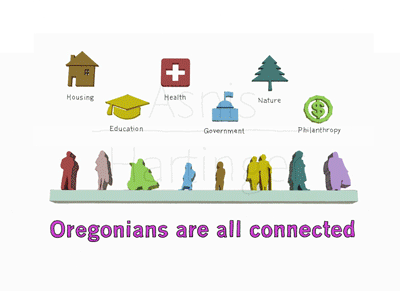How We're Incorporating Feedback from Healthy Beginnings+Healthy Communities into our New Initiative, Civic Health
/Seven members of the Healthy Beginnings + Healthy Communities Collaborative Immigrant and Refugee Engage Project pose in front of a community garden at a HB+HC gathering in 2018.
Last year we hired an outside contractor, Dawn Richardson who is an Associate Professor in the OHSU-PSU School of Public Health, to conduct interviews with the Collaboratives from our Healthy Beginnings+Healthy Communities initiative (HB+HC). We wanted to know what worked and what didn’t so we can improve as a funder and partner to community-based organizations throughout Oregon and Southwest Washington. We’re using this feedback as we prepare for our next multi-year initiative, Civic Health.
Some themes that emerged from these interviews:
The multi-year funding framework, and funding for advocacy, lobbying, and movement building work, were critical to this work. Many Collaboratives increased their capacity for and understanding of 501(c)(4) work.
Collaboratives were energized by the cohort model, which connected organizations across our region and across movements, allowing Collaboratives to learn from one another and build relationships.
As HB+HC moved further into 501(c)(4) political work, some Collaboratives who were not prepared for this were left behind. They felt disconnected from the HB+HC Cohort.
Collaboratives appreciated responsiveness and flexibility in the trajectory of HB+HC.
Turnover among staff at grantee organizations posed difficult. New staff experienced some difficulty and confusion in joining HB+HC and were hard pressed to catch up with everything that had happened before they joined.
Some Collaboratives expressed concern about the lack of attention given to racial and ethnic inequity, anti-blackness, colorism, microaggressions and oppression broadly and within the Cohort. NWHF did not follow through on requests for open dialogue.
Collaboratives far from Portland felt disconnected sometimes and struggled to bring their learnings from Cohort gatherings back to rural communities.
Some Collectives appreciated the opportunity to take ownership over the Cohort’s focus and direction, while others felt a lack of clarity and experienced anxiety not knowing where the Cohort was headed.
Biannual reports felt onerous.
Collaboratives enjoyed retreats and gatherings and were pleased with Northwest Health Foundation’s choice to hire an external facilitator. They felt that hiring someone from outside NWHF and the Cohort allowed for the transparency and openness necessary for building trust and community.
Northwest Health Foundation has taken this feedback to heart, and we are actively responding to it as we create a plan for Civic Health.
The Civic Health Cohort Program will fund organizations for four years with 501(c)(4) dollars and emphasize electoral organizing and movement building. We convened Civic Health Assessment & Planning, a sort-of pre-initiative learning opportunity, to ensure groups had an opportunity to give input while we were planning the initiative and to ensure they understand and are prepared for the work supported by Civic Health. While we’ll still fund groups with a range of experiences, we’re increasing funding and coaching to emerging, less-experienced organizations so that they don’t get left behind.
We asked HB+HC Collaboratives to reapply to renew funding every year. With Civic Health, groups will only be asked to reapply to renew funding halfway through the initiative (after two years). This is to make sure groups are still well-aligned with Civic Health.
We are continuing with a cohort model similar to the HB+HC Cohort. We will bring all of the Civic Health organizations together for convenings. We will also visit peer organizations throughout the country to learn how groups in other places are implementing Integrated Voter Engagement. Groups in Civic Health are not a state-wide coalition. Rather, they are a cohort of organizations that want to build their capacity for electoral work and are committed to shared values and supporting each other’s work. To act together on state-wide or regional elections or policy change, the groups will need to engage and coordinate with groups outside of Civic Health and voters outside their base.
NWHF enters Civic Health with a BIPOC (Black, Indigenous, and other people of color) lens. This means we’re prioritizing Black and Indigenous communities in light of the fact that Black and Indigenous communities experienced the brunt of violence in the founding of our country, and continue to experience violence as a result of history as well as present-day policies, anti-black racism, and Native erasure. All groups funded by Civic Health must be committed to developing a common understanding and approaches to building power. This will include learning about and implementing movement frameworks like disability justice and reproductive justice.
While we’re still leaving room for flexibility and responsiveness, we also hear the folks who want more direction. We hope that providing clear goals and strategies and the framework of Integrated Voter Engagement will help create that structure.
Through the research and planning period, we’ve worked with Dancing Hearts Consulting, a Black woman-led firm based in Southern Oregon. We’ll continue to contract with Dancing Hearts Consulting to guide and facilitate Civic Health. The founder and director of Dancing Hearts Consulting, Esperanza Tervalon-Garrett, facilitated pieces of HB+HC, and Collaboratives appreciated what she brought to the experience. We also hope that working with a consulting firm from a rural community will enhance our understanding and inclusion of rural communities.
We know we’ll make mistakes with Civic Health, but we promise to learn from the mistakes we made with Healthy Beginnings+Healthy Communities. We’re excited to embark on this journey in 2021.



















